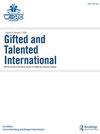Gender differences in self-concept, locus of control, and goal orientation in Mexican high-achieving students
Q3 Social Sciences
引用次数: 8
Abstract
ABSTRACT The study compares self-concept, locus of control, and goal orientation characteristics of male and female Mexican high school high-achieving students. Three scales were administered to 220 students; 106 (49%) were males and 114 (51%) females. By means of a discriminant analysis, both groups were compared in relation to the variables such as social self-concept, academic self-concept, achievement motivation toward study, and attributions regarding academic success or failure. It was found that female students have a better academic self-concept and a higher achievement motivation than males. Findings are consistent with previous studies in Mexico that provide evidence of females having greater emotional resources associated with school success.墨西哥高成就学生自我概念、控制点及目标导向的性别差异
摘要本研究比较了墨西哥高中男女优等生的自我概念、控制源和目标取向特征。采用三种量表对220名学生进行测试;男性106例(49%),女性114例(51%)。通过判别分析,比较两组学生在社会自我概念、学业自我概念、学业成就动机、学业成败归因等变量上的差异。研究发现,女生的学业自我概念和成就动机均高于男生。这一发现与之前在墨西哥的研究一致,这些研究提供了证据,证明女性拥有更多与学业成功相关的情感资源。
本文章由计算机程序翻译,如有差异,请以英文原文为准。
求助全文
约1分钟内获得全文
求助全文

 求助内容:
求助内容: 应助结果提醒方式:
应助结果提醒方式:


